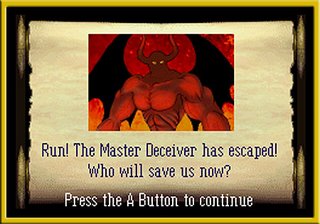This is not your best night. You're on your own, hungry, stuck somewhere in the middle of an unending project you never wanted to do. After 9 o'clock, you leave your apartment to wander the streets in search of something to eat. Did you even eat lunch? You can no longer remember. All around you, the streets are crowded with people determined to have a good time. You, on the other hand, end up in Burrito-town, population 13. The menu board shows off the Burrito-town chain's sense of humor. Pains have been taken to give each Burrito-town burrito a funny name. There are burrito's called, "Mr. Bean," "No, Woman, No Cry," "Pulpo Fiction," "CBGB (Corn, Beans, Garbanzo Beans)," "Old Yeller," "Holy Mole!," and "Dude, where's my chorizo?" Each of these burrito's come in multiple sizes, ranging from "Gi-normous" to "Webster."
You have a profound need for sustenance.
While you eat you watch the tv screwed into the wall above the cashier. There are a few scenes of people keep getting in and out of cars, followed by a lunch at a country club cut short by an angry outburst. Because of the bad reception and inaudible volume, whatever story the images are trying to tell is impossible to follow. Instead, you enjoy one of the many mixed pleasures of living in this city. You listen to a stranger describe his novel. There are two guys in the booth beside you. One of them is eating a "Holy Mole!," the other is just eating chips. The guy with the chips is almost finished his first draft.
"It's about this guy," he says. "He's a regular guy, he's got a job, an apt, whatever, but one day - and I'm really sure yet exactly how this happens, but I think it involves getting into a car accident with the Devil - the guy ends up with this amazing power. Everything he wants to happen, happens. He can, like, control everybody with his mind. He goes to the office and he gets a raise. Just because he wants it."
The other guy with the burrito interrupts him, "What does he do with this power? Does he become President? Does he figure things out in the Middle East?"
"Whooah, that's way out my league. This is my first novel." He dribbles some green salsa on his chips. "What the guy really wants is to get a girlfriend."
"Shouldn't be too hard."
"It isn't. But that's the problem. I mean he can get any girl he wants. There's no challenge anymore. The moral of the book is, kind of, be careful what you wish for - and there is such a thing as too much of a good thing. After a while the guy gets fed up with the mind control. I mean, he realizes that the girls don't really want him. It's not real. He ends up getting really depressed. He just sits in his apartment and watches tv all day. Pretty much what he was doing before he got the special power, only now his apartment is a lot nicer, because he makes, like, mad bank."
The "Holy Mole!" guy nods. "If I had more money, I'd buy one of those hd plasma flat screens."
"Yeah, totally. And get digital cable."
You've eaten half of the burrito and you're full, but you stay to hear the guy with the chips explain how the book ends.
"Well, one day the dude meets a girl he can't control, and the whole question is like, 'is she the devil or is she the love of his life?"
"That's some profound shit. Which one is she?"
"Both."
"Wow."
"Yeah, originally it was a screenplay. But I got a lot of feedback on my blog about how the plot was hard to follow. So I figured I would make it into a novel."
"Cool."
It's time to go home and write.








